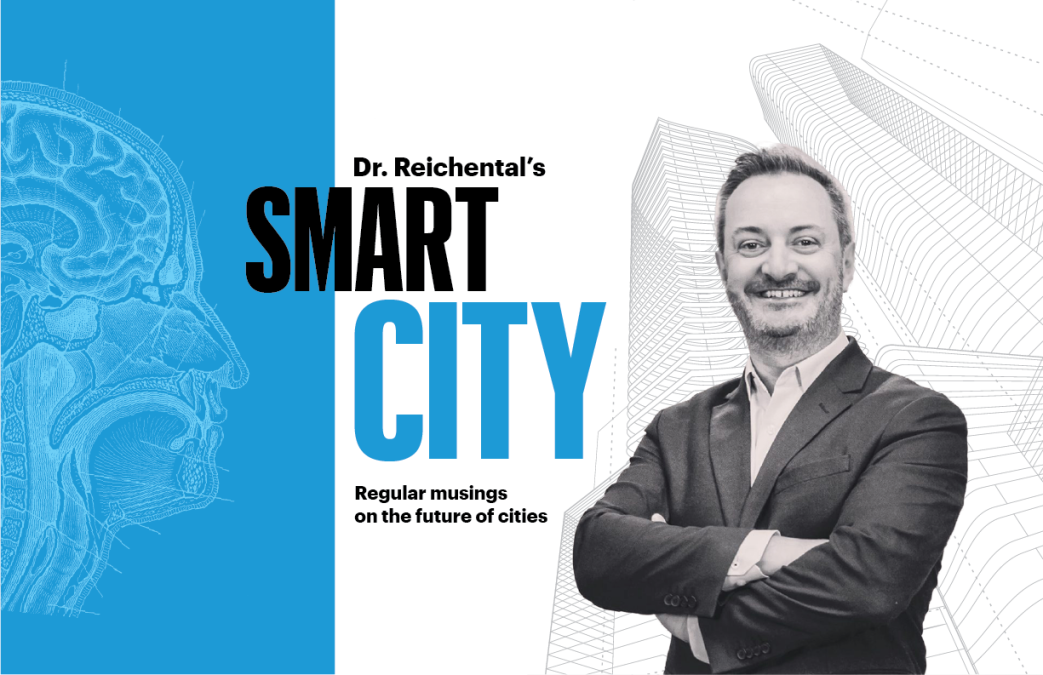How cognitive cities can boost urban innovation

How well a city acquires, processes and responds to community insights can be said to be a measure of its cognitive qualities.
Historically, a city’s cognitive capabilities have been limited by a deficit of current and actionable intelligence, but that’s changing in a big way. By embracing digitalization, data and sensors, cities are upping their cognition game and tapping into a superpower that can boost responsiveness and urban innovation.
City cognition grows up
If a city is to have a continuous and frictionless flow of feedback and engagement, it must leverage and optimize a larger variety of communication and feedback instruments and channels.
Traditional engagement — such as in-person meetings, phone calls to city officials, letters and emails — are all effective but with serious weaknesses. For one thing, it’s far too easy to react to the person who shouts the loudest rather than the issue that matters most. Knowledge can also be anecdotal and lack substance, or occur too infrequently to provide adequate feedback, as is the case with elections.
Cognitive cities have continuous and frictionless feedback from their residents and systems and use it to inform their policies.
As the supporting technologies evolve, a cognitive city will be more than one that is simply reactive to feedback. In a future state, cognitive cities will receive and interpret signals from people and machine sensors that will enable proactive responsiveness. Imagine a city that schedules buses and trains relative to any changes in commuting behavior — this happens not because someone observes delay issues or a person complains, but because the systems predicted evolving behavioral patterns and shifted scheduling proactively.
Cognitive cities in action
In a traditional sense, most municipalities are already cognitive cities in that they respond to feedback from their communities. But this is cognition that belongs to a different era.
Today, with an array of tools now available in a digital and connected world, 21st century city cognition is a game-changer.
Open data is a good start. So is social media and online sentiment analysis. Online collaboration platforms are increasingly common for collecting and interacting with community feedback. An increasing number of cities are growing their data analytics capabilities, too. Many are hiring chief data officers and teams of data analysts. Impressive progress is being made by some, and others will surely follow.
As the digital transformation of local government unfolds, new possibilities for city cognition are now beginning to reveal themselves. The emergence of artificial intelligence as a factor in city management is elevating options for data-driven decision-making and proactiveness. For example, what knowledge can be gleaned from analyzing voluminous data sets from the increasing number of “internet of things” sensors now being deployed? What about project data? Imagine the knowledge that can be acquired by using AI to harvest lessons from thousands of projects or from hundreds of open data sets.
Becoming a cognitive city
While most cities will develop their cognition capabilities over time, Neom, an ambitious city being built in northwestern Saudi Arabia, may be the first cognitive city created from the ground up. Baked into the fabric of the new city will be technology to collect massive insights on community behaviors and needs. Not satisfied with simply gaining actional knowledge, planners want Neom to be a city that automatically uses insights to deliver services without the need for city staff intervention. Certainly, privacy risks will be a concern, but city leaders have said that privacy will also be a priority.
Cognition might not be on the radar for most city leaders yet, but it soon will be. Cities that build cognitive capabilities, even modest ones, will be capable of proactive actions that create smarter communities. They may even produce results that lower the cost of common services by avoiding the typically higher costs associated with messy reactive efforts.
New ideas and technologies enable cities to design the future differently. They are providing city leaders with many more options for delivering better quality city experiences. A cognitive city strategy may soon be the right choice for many leaders as they develop their smart-city plans.
 Jonathan Reichental is the former chief information officer of Palo Alto, California. He’s now an instructor at several institutions, including the University of California, Berkeley, and online through LinkedIn. He’s the founder and CEO of the advisory and investment firm Human Future, and the author of Smart Cities For Dummies.
Jonathan Reichental is the former chief information officer of Palo Alto, California. He’s now an instructor at several institutions, including the University of California, Berkeley, and online through LinkedIn. He’s the founder and CEO of the advisory and investment firm Human Future, and the author of Smart Cities For Dummies.
He also publishes a regular newsletter. To receive it free in your inbox, sign up here.






